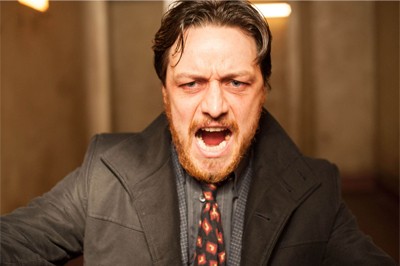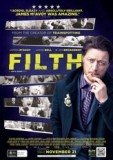| Reviews & Columns |
|
Reviews DVD TV on DVD Blu-ray 4K UHD International DVDs In Theaters Reviews by Studio Video Games Features Collector Series DVDs Easter Egg Database Interviews DVD Talk Radio Feature Articles Columns Anime Talk DVD Savant Horror DVDs The M.O.D. Squad Art House HD Talk Silent DVD
|
DVD Talk Forum |
|
|
| Resources |
|
DVD Price Search Customer Service #'s RCE Info Links |
|
Columns
|
|
|
Filth
Magnolia Home Entertainment // R // May 30, 2014
List Price: Unknown [Buy now and save at Fandango]

If you have had the chance to see Trainspotting, then you know how a well-written crime drama can turn out. The material all started with the novel's author Irvine Welsh, which was ultimately written for the silver screen by John Hodge. The film has several timeless references that will continue to be utilized and understood by pop culture. One of Irvine Welsh's newer novels called Filth has also received the motion picture treatment. Writer/director Jon S. Baird has taken the task to bring this to the big screen, although it simply doesn't deliver the same magic that Trainspotting does. While it tries so extremely hard to do accomplish that goal, the dramatic and comedic tones ultimately work against each other, rather than together.
Bruce Robertson (James McAvoy) is a bipolar, bigoted junkie cop. There is a promotion that he has been dreaming of for quite some time. In order to win his wife and daughter back, he must achieve this goal. The more intense this competition for the position becomes, the more Bruce continues to hallucinate and fall deeper into an emotional dark hole. However, he may not be able to find his way out of it. Bruce quickly notes that he isn't able to trust anybody, as his only goal is to receive the promotion that will change his life completely.
The first time that we receive narration from Bruce Robertson is when he is sitting at a meeting for work. He doesn't care much for anything that is being said, but he's analyzing each of his co-workers by judging their chances of receiving the promotion. He realizes that he has some competition, so he needs to keep his wits. This is most certainly an appropriate way to start the film, as it introduces us to the characters rather quickly, yet it provides the main character's want. However, there's a reason why this film is titled Filth, and the character of Bruce perfectly embodies the meaning of this word. He commits many disgusting acts, and while that could make it difficult for some audiences to connect with him, it allows him to be a more intriguing person to follow. Almost every decision that Bruce makes proves to be utterly immoral, but the story of his want most certainly fuels what turns out to be one of the only positive elements of this motion picture.
Once we become aware of Bruce's need, the film begins to tear apart from the seams. I will not be giving any spoilers, but the picture quickly makes a sharp turn into a very "cartoonish" universe that completely took me out of the film. It became a lot less about the competitive nature of the big promotion, and a lot more about our lead character's mental state. Even despite all of the horrible things that he has done, the film tries way too hard to make us sympathize with him at this point. This would have worked much better if we were simply to have continued to follow the corrupt cop that always has an alternate agenda. This is the huge turning point of the film where the tones truly begin to turn on one another. Once they do, we never see them work with one another in order to create a cohesive piece of filmmaking. Rather, it turns into a seemingly confused feature that is poorly planned out.
The first act proves that this is a crime drama with comedic elements, although this changes around the mid-point of the second act. The transitions become entirely too sloppy, as the picture randomly decides to be funny or dramatically serious. It flips between the two until the credits start rolling. However, since Baird is juggling both of these tones at the same time, he doesn't manage to succeed with either of them. There are several critical emotional scenes that don't receive the attention that they deserve. Bruce has a few emotional moments with a couple women in the film where he begins to show his true self. These scenes are incredibly successful, but then we're instantly pulled back into a chaotic mess that isn't able to fix itself. Writer/director Jon S. Baird incorporates a lot of dark comedy that falls flat. None of it is actually funny, making for a truly awkward viewing experience.
Since this is coming from an Irvine Welsh novel, I'm not very surprised that this managed to score a cast of this caliber. James McAvoy does a wonderful job expressing even the smaller nuances of Bruce Robertson's personality. Even though the dramatic moments deserved a lot more attention, McAvoy sells these scenes with a clear expertise. He feels so incredibly authentic and confident. It's just such a shame that this character's need has driven Bruce to a place that truly hinders the film. Jamie Bell turns in a believable performance as Bruce's colleague, Ray Lennox. This character proves to be quite corrupt as well, and Bell's energy is incredibly fitting here. One of the few great decision made for Filth was the casting of Imogen Poots in the role of Amanda Drummond. She doesn't receive very much screen time, but she's great here. She has an emotional moment with Bruce on the stairway of their office, and delivers what is perhaps one of the strongest scenes in the picture. Poots feels so incredibly natural here, that you'll find yourself wanting to see her more often.
It should be quite clear that this is no Trainspotting. Perhaps one of the most disappointing things about Filth is that there is actually a fairly strong character study hidden behind the mess. Bruce's want to receive this promotion and get his wife and daughter back is great material, but his ultimate need is unfortunate and ends up causing the entire film to be derailed. The tone transitions are terrible, leaving us with a feature that doesn't all come together. It feels all over the place, and doesn't manage to pull itself back together before it ends. There are a few powerful moments to be had, although none of them receive the attention that they deserve. Filth often plays to its weakest links, rather than taking advantage of its stronger bits of material. Rent it.

|
| Popular Reviews |
| Sponsored Links |
|
|
| Sponsored Links |
|
|
| Release List | Reviews | Shop | Newsletter | Forum | DVD Giveaways | Blu-Ray | Advertise |
|
Copyright 2024 DVDTalk.com All Rights Reserved. Legal Info, Privacy Policy, Terms of Use,
Manage Preferences,
Your Privacy Choices | |||||||











